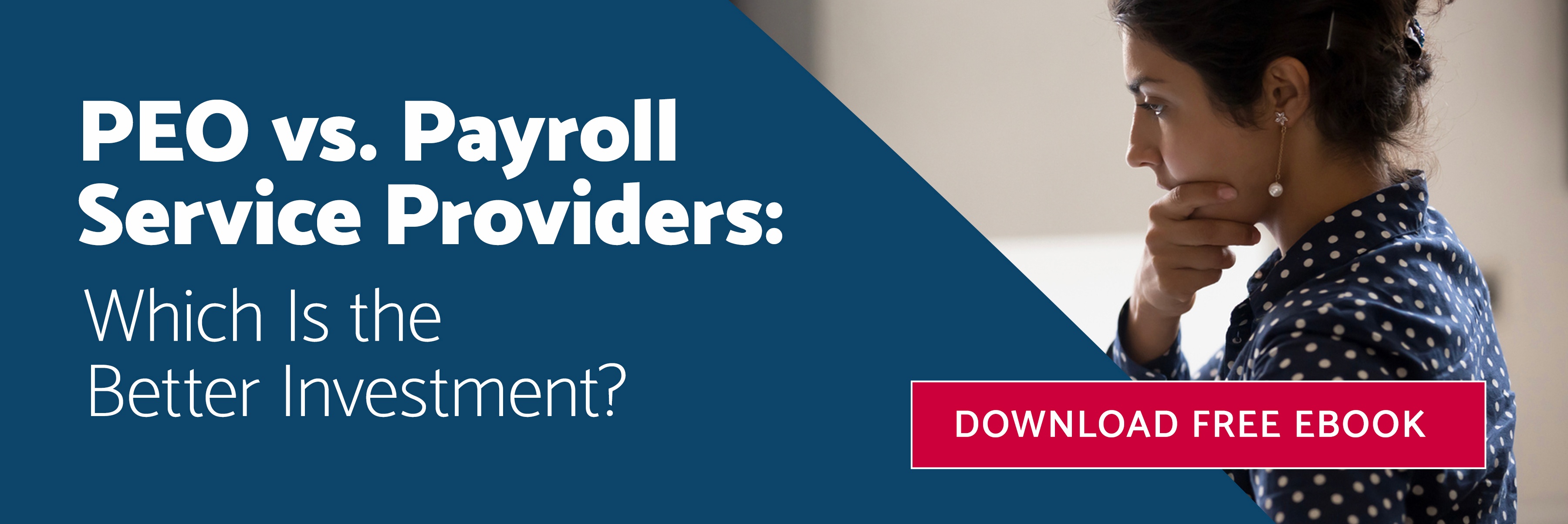OneSource Business Solutions Blog
How Does HR Outsourcing Reduce Costs?
.jpg?width=676&name=iStock-1181383072%20(1).jpg)
There is always a lot of talk about HR outsourcing. Much of it focuses on whether HR outsourcing has a good ROI. Many companies think it does not; they look at outsourcing HR’s cost and decide that it is clearly cheaper to do it in-house, especially if they have a relatively low administrative burden that other staff can easily handle.
This is a fallacy that stems from not looking closely enough at the savings that are possible. With the right HR outsourcing partner, you can net a positive ROI while reducing your existing in-house staff’s administrative burdens.
How HR Outsourcing Reduces Costs
Outsourcing HR comes with significant cost savings. Even outsourcing methods that don't have a direct positive ROI, can save money in certain circumstances. For example, a simple mistake in payroll can lead to significant costs. One company underpaid overtime by about $600, only to end up on the hook for a $1,216 reward to the employee and legal fees, totaling over $41,000. Payroll mistakes can also cost you in terms of employee trust and higher turnover.
At a more routine level, outsourcing administrative duties and payroll produce cost savings. You may be able to avoid adding another full-time employee and avoid assigning these duties to yourself or other staff members who need to focus on core competencies.
When you outsource to a professional employer association (PEO), you get a positive ROI, which stemming from reduced costs for employee benefits, workers comp, and 401(k) retirement plans fees.
Cost Savings From Payroll Processors
The primary saving from using a payroll processor is that you don't need to hire extra HR personnel just to handle payroll. Other companies get around this by doing payroll themselves, or by assigning it to the office manager, receptionist, or anyone who has downtime. This wastes the employee's time and greatly increases the risk of costly mistakes.
However, if all you do is outsource payoll, the ROI can easily become negative, depending on the amount of payroll you need to process. It is much more efficient to partner with a PEO.
Reducing Costs Through PEOs
A PEO is the best way to gain a positive ROI and reduce your HR costs. Below are just a few mechanisms that lead to positive ROI.
Economies of Scale
One of the biggest advantages of a PEO is that it gives you economies of scale when negotiating for benefits. Through a mechanism called co-employment, your employees can be added to the PEO's healthcare and retirement plans, as well as their workers' comp insurance.
Workers comp premiums are based on your payroll, your industry classification (rate) and your experience modifier (how many claims have been made). For a startup, premiums tend to be higher because of the lack of claims history, and for a small company a single incident can send premiums shooting up.
Health benefits outsourcing allows you to pay less but gain more. You may be able to afford benefits you previously could not offer, such as dental and vision. This helps you attract and retain the talent your business deserves. For many small companies, offering any kind of decent retirement plan is complex and expensive. A PEO gets around this by including the employees of multiple clients and the PEO itself. You can even offer life insurance, short and long term disability, and voluntary benefits.
Increased Administrative Savings
A payroll processor handles payroll. A PEO can handle all of your routine administrative tasks, even letting you do HR without an HR department. They can do the tedious parts of onboarding a new employee, such as benefits forms, immigration forms, etc. They can even help with the routine part of finding candidates.
A PEO can also help you put together employee handbooks, abiding by your policies but using their skills and experience to make the process easier. They can maintain your employee files, ensure compliance, and do drug screening and background checks as required. They can manage workers' comp, help with your return to work program, and assist with safety training.
All of this means that your HR team can focus on improving your corporate culture and are not having to borrow staff hours from other departments.
Employee Engagement
Many of the benefits of partnering with a PEO are tangible savings in time and money. However, one huge benefit is intangible: Improved employee engagement. According to a study by the National Association of Professional Employer Associations, employees of PEO clients report improvements in employee engagement, intent to stay with current employer, trust, and confidence.
PEOs help support employee engagement by helping businesses focus on their core, which helps employees feel that the business will be successful and that they can align themselves with its goals and freely commit for the long term. PEO clients tend to have a stronger company culture and tend to offer better training to employees.
Engaged employees demonstrate lower absenteeism and turnover, fewer safety incidents, and higher productivity. It can be hard to put a tangible monetary value on this, but improved employee engagement is a huge benefit of working with a PEO.
These are just some ways HR outsourcing reduces costs and improves your productivity and bottom line. Working with a PEO is the best way to handle HR for your small business and position yourself to gain a competitive advantage and grow your company.
Recent Posts
Posts by Topic
- HR Outsourcing (37)
- Employee Benefits (14)
- Payroll & HR Administration (5)
- Strategic Planning & Research (5)
- Company Culture (4)
- HR Compliance (4)
- Industry – Professional Services (4)
- PEO (4)
- Workers’ Comp (4)
- Employee Turnover (3)
- OneSource PEO Company News (3)
- performance management (2)
- Navigating COVID-19 (1)
- manufacturing industry (1)
